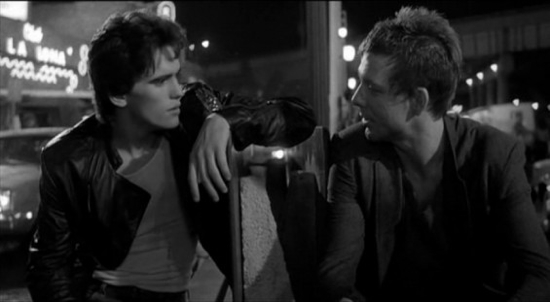The presence of absence is everywhere in Rumble Fish, which was the second SE Hinton novel to be adapted for the big screen by Francis Ford Coppola (following The Outsiders, also released in 1983). The unstable legacy of Mickey Rourke’s Motorcycle Boy, missing or inept parental figures and the spectre of California loom like a malignant ennui over the unidentified city inhabited by Matt Dillon’s Rusty James and his herd of disaffected youths. This city, rather like the town in Peter Bogdanovich’s The Last Picture Show, is teeming with a stifling humidity, devoid of any respite from the crippling languor of daily life.
All this talk of existential burdens suggests that Coppola succeeded in his oft-stated claim that Rumble Fish was "Camus for teenagers". He didn’t but, almost thirty years on, it reads more like Catcher In The Rye for adults: an idiosyncratic, frustrating, unintentionally humorous but often beguiling trip through the feverish fantasies of adolescence, and a eulogy to fractured brotherhood.
Rumble Fish represents something of an anomaly within Coppola’s oeuvre. Initially seen as an artistic suicide note from a maverick director driven to despair at the bureaucratic bottlenecks within the heart of the studio system, it now seems like a fulcrum between the teeming, kaleidoscopic machismo of Apocalypse Now (1979) and the nostalgic potpourri of Peggy Sue Got Married (1986). Rusty James’ search for identity is mirrored by that of the film. Coppola cited Anatole Litvak’s WWII picture Decision Before Dawn as the basis for the dolorous fog which engulfs the visuals, and Robert Wiene’s expressionist silent horror The Cabinet Of Dr Caligari as the inspiration for the silhouette-as-character effects. However, the choreography for the rumble scene which introduces the Motorcycle Boy, provided by San Francisco Ballet director Michael Smuin, shifts the set piece into the realm of West Side Story (albeit a mute interpretation) and foreshadows the stylised violence of Julien Temple’s Absolute Beginners three years later.
This identity anxiety extends into Coppola’s direction of his all-star cast. At times, it feels as if he and cinematographer Stephen Burum are plainly disinterested in anything his characters say and do, preferring to create a veritable portrait gallery of the striking faces on display. This actually works a charm. In addition to Rourke’s wounded charisma we get the dental-propelled gawkiness of Sofia Coppola in a career-best performance; the sharp-suited sagacity of Laurence Fishburne; the precocious, blooming schoolgirl allure of Diane Lane; and Matt Dillon’s concentrated efforts to master the art of composure. While each may still be lacking in dramatic adroitness, this is compensated by the sheer personality evinced by the camera lingering on these faces, torn between burgeoning self-assurance and sheer bewilderment. True, it’s debatable whether this inner doubt stems from a masterful depiction of youthful confusion, or whether it’s simply the cast expressing befuddlement at their involvement in such a mystifying drama.
There is a fine line between expressing this mystique and resorting to pastiche. Coppola shamelessly straddles both. In fact, the boundaries between a profound aesthetic statement and a simple teen violence flick are disturbed throughout, affording the movie a certain friction which still fizzes. The gangs portrayed appear more brittle than brutal, and permanently on the cusp of dissolving. Even when the Motorcycle Boy returns from California, he shows little interest in rehashing past glories or even in "running this side of town", preferring to focus his obsessions on a pet store’s colourful Siamese fighting fish. However, Coppola imbues certain symbols with all the grace and charm of a severe industrial accident. The constant reappearances of a large handless clock, along with omnipresent tick tocks, display his heavy-handedness, bullying the viewer into realising this-is-an-art-house-flick-and-everything-is-therefore-meaningful.
The previous year Pauline Kael had dismissed Coppola’s musical One From The Heart, remarking that: "This movie feels like something directed from a trailer. It’s cold and mechanized; it’s at a remove from its own action." In so doing she unwittingly laid the foundations for the lukewarm response to Rumble Fish, which flopped spectacularly on release. Coppola’s descent into stylisation and foolhardy abandonment of narrative served to alienate rather than educate the young audience he was aiming for. While he certainly managed to nail the visual properties of moisture, steam and smoke, the more tangible tropes of sex and violence were only dealt with in an abstract fashion. Unlike say, Diner or The Wanderers, the nostalgic elements here are also confounded. You can imagine the Motorcycle Boy stepping out from Rebel Without A Cause. Rusty James could amble his way into Andy Warhol’s Flesh, while the local movie theatre is seen playing Debbie Does Dallas, suggesting the action actually takes place in 1978. The sensual, stylised imagery was primed to attract and seduce, but ended up too consumed with uncertainty. As our doomed anti-hero whispers, "If you’re gonna lead people, you have to have somewhere to go."
It’s easy to draw a comparison between Coppola’s career and that of the Motorcycle Boy, two restless souls with their grandest and most audacious achievements lying behind them. Rumble Fish was arguably the director’s most intensely personal project, recalling his own infatuation with his older brother August, to whom the film is dedicated. His ambitions may have stated a desire to reach out and empathise with disaffected fraternity, to provide a beacon of inspiration for the lonely and hormonal, starved of intellectual and emotional companionship. But this one from the heart, with all its flaws and sidesteps, reveals itself to be so personal, it could really only have been created with one person in mind, and that’s Coppola himself.
Rumble Fish is out now on Blu-ray through Masters of Cinema/Eureka Entertainment.


